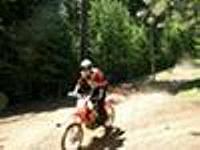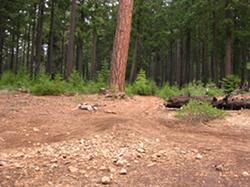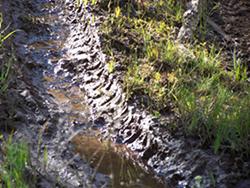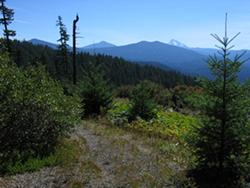Oregonians speak out for a fair Mt. Hood OHV Plan
In the short 60-day comment period, nearly 1,000 Oregonians demanded a fair OHV Plan that protects clean water, quiet recreation, and wildlife habitat.




The Mt. Hood OHV Plan comment period is over but the fate of our clean drinking water, access to quiet recreation, and wildlife habitat is still unknown. The Forest Service provided two options for managing off-highway vehicles (OHVs) in Mt. Hood National Forest.
In response to this choice, Oregonians voiced overwhelming support for a fair plan that protects the forest from damage caused by OHV riding.
During the 60-day comment period:
• Bark incorporated groundtruthing information into our 139-page comments. These comments detail the scientific and legal flaws in allowing OHVs to threaten water quality, other recreational experiences, and wildlife habitat.
• 222 Oregonians used our Action Alert page to submit comments.
• Bark’s door-to-door canvass informed 3,892 Hood River and Portland residents on the comment period and collected 456 comments.
• Senator Ron Wyden and Congressman Earl Blumenauer sent a joint letter requesting the Forest Service to avoid placing OHVs adjacent to Wilderness.
• At least 37 Oregonians utilized Bark’s comment writing sessions and staff to submit substantive personal comments. 22 4th graders also submitted a petition, attached to comments, asking the Forest Service to ban OHVs in the Forest, but noting that if they had to allow them, they should chose a plan that protects wildlife habitat.
• Bark worked with numerous community groups, recreational organizations, and governmental entities. The following organizations submitted comments on the OHV Plan, most utilized Bark's resources and expertise to write their comments:
American Native People’s Organization, Audubon Society of Portland, Backcountry Horsemen of America, Clackamas Stewardship Partners, Columbia Riverkeeper and Oregon Citizens Against the Pipeline, Friends of the Columbia Gorge, Friends of Mount Hood, Gifford Pinchot Task Force, International Mountain Biking Association, Lower Columbia Canoe Club, Maryland Orinthological Society, Mazamas, Mt Hood Corridor Community Planning Organization, Northwest Environmental Defense Center, Oregon Department of Fish and Wildlife, Oregon Sierra Club, Oregon Wild, Oregon Wildlife Federation, Rhododendron Community Planning Organization, State Historic Preservation Office, and last but not least the United States Environmental Protection Agency
• Despite all these achievements during the comment period, we must still keep a vigilant eye on the forest. Just last week hikers climbing Salmon Butte, on a beautiful hike in the heart of the Salmon Huckleberry Wilderness, were horrified to discover seven people riding dirt bikes and ATVs illegally to the top of this special place. Pictures of this dramatic OHV incursion into designated Wilderness can be viewed at
http://www.flickr.com/photos/lewscholl/4041981996/in/set-72157622656399458/
We will anxiously await the publication of a final Environmental Impact Statement late this winter, but in the meantime, please let us know if you see any unlawful OHV use or if you are interested in groundtruthing.
In response to this choice, Oregonians voiced overwhelming support for a fair plan that protects the forest from damage caused by OHV riding.
During the 60-day comment period:
• Bark incorporated groundtruthing information into our 139-page comments. These comments detail the scientific and legal flaws in allowing OHVs to threaten water quality, other recreational experiences, and wildlife habitat.
• 222 Oregonians used our Action Alert page to submit comments.
• Bark’s door-to-door canvass informed 3,892 Hood River and Portland residents on the comment period and collected 456 comments.
• Senator Ron Wyden and Congressman Earl Blumenauer sent a joint letter requesting the Forest Service to avoid placing OHVs adjacent to Wilderness.
• At least 37 Oregonians utilized Bark’s comment writing sessions and staff to submit substantive personal comments. 22 4th graders also submitted a petition, attached to comments, asking the Forest Service to ban OHVs in the Forest, but noting that if they had to allow them, they should chose a plan that protects wildlife habitat.
• Bark worked with numerous community groups, recreational organizations, and governmental entities. The following organizations submitted comments on the OHV Plan, most utilized Bark's resources and expertise to write their comments:
American Native People’s Organization, Audubon Society of Portland, Backcountry Horsemen of America, Clackamas Stewardship Partners, Columbia Riverkeeper and Oregon Citizens Against the Pipeline, Friends of the Columbia Gorge, Friends of Mount Hood, Gifford Pinchot Task Force, International Mountain Biking Association, Lower Columbia Canoe Club, Maryland Orinthological Society, Mazamas, Mt Hood Corridor Community Planning Organization, Northwest Environmental Defense Center, Oregon Department of Fish and Wildlife, Oregon Sierra Club, Oregon Wild, Oregon Wildlife Federation, Rhododendron Community Planning Organization, State Historic Preservation Office, and last but not least the United States Environmental Protection Agency
• Despite all these achievements during the comment period, we must still keep a vigilant eye on the forest. Just last week hikers climbing Salmon Butte, on a beautiful hike in the heart of the Salmon Huckleberry Wilderness, were horrified to discover seven people riding dirt bikes and ATVs illegally to the top of this special place. Pictures of this dramatic OHV incursion into designated Wilderness can be viewed at
http://www.flickr.com/photos/lewscholl/4041981996/in/set-72157622656399458/
We will anxiously await the publication of a final Environmental Impact Statement late this winter, but in the meantime, please let us know if you see any unlawful OHV use or if you are interested in groundtruthing.
More about Mt. Hood Off-Highway Vehicle Plan...




